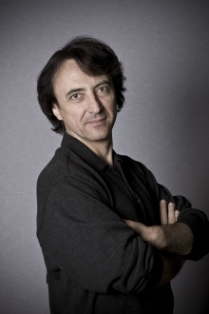Bonne Année and Joyeux
anniversaire helped make the Cincinnati Symphony Orchestra’s first concert
of the New Year a special event Friday evening at Music Hall.

Sunday (Jan. 11) is music director Louis Langrée’s 54th birthday and there was a party following the concert to help the maestro celebrate. Many audience members left special greetings on a board set up in the Music Hall foyer.
The concert itself, which closed with Beethoven’s Symphony No. 2, was a celebration of the human spirit. Preceding the Beethoven was a reading of selections from the composer’s famous Heiligenstadt Testament, written in 1802, contemporaneously with the Second Symphony.
Read with keen expression by Leilani Barrett of Ensemble Theatre of Cincinnati, the letter -- in which Beethoven confides his deepest feelings about his approaching deafness and his resolve to live for his art rather than succumb to despair -- made a stunning contrast with the Symphony, one of Beethoven’s sunniest.
Also on the program was the Piano Concerto No. 3 by Bela Bartok. Written in 1945, as Bartok was dying of leukemia, it, too is reflective of good feelings. Soloist was pianist Jean-Efflam Bavouzet in his CSO debut.
Bavouzet’s performance was well-defined and engaging. The opening Allegretto was perky and upbeat to the last exchange of piano and flute. The central Adagio, marked religioso, was heart-rending, a kind of farewell by the composer, with chorale-like writing enclosing a central section, livened by woodwind bird calls and followed by a deeply moving climax. Bavouzet charged directly into the zesty, outgoing (even jazzy) Allegro vivace finale, where he whizzed over the keys to the work’s emphatic conclusion.
Penned when he was 31, Beethoven’s Heiligenstadt Testament puts his life and unparalleled achievement as a composer into perspective. He had tried to hide his ailment: “How could I possibly admit such an infirmity in the one sense which should have been more perfect in me than in others, a sense which I once possessed in highest perfection?” he asks. He speaks of suicide, but concludes: ”Only art it was that withheld me. Ah, it seemed impossible to leave the world until I had produced all that I felt called upon me to produce.”
Langrée led the CSO in a rewarding performance of the Beethoven Symphony, one marked by close ensemble and a lively spirit. The second movement Larghetto was flowing and expressive, beautiful in its elegance, while making one smile. Beethoven’s sense of humor came through clearly in the scherzo, where the voices “answer” each from all over the orchestra. The jollity continued into the finale, in effect a shout out by Beethoven to his relentless fate.
The concert opened with “Funeral Music” for String Orchestra by Polish composer Witold Lutoslawski. Written between 1954 and 1958 in memory of Bartok, its four connected movements demonstrate Lutoslawski’s use of twelve-tone technique within an arch-form after Bartok’s example. As performed by the CSO strings, it had color, clarity and considerable affect.
The concert repeats at 8 p.m. tonight at Music Hall. Tickets begin at $12. Call (513) 381-3300, or order online at www.cincinnatisymphony.org